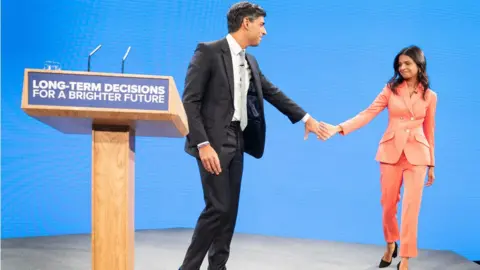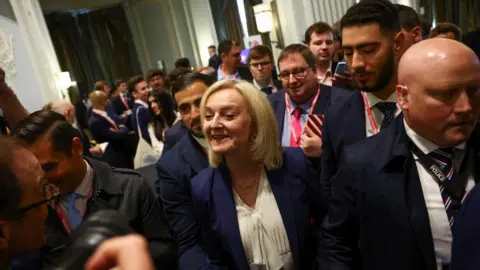The facts have changed, says Rishi Sunak, as he scraps HS2 leg
"The facts have changed," the PM has said, as he confirmed the HS2 high-speed rail line from Birmingham to Manchester would be scrapped.
Addressing his party conference, Rishi Sunak said the project had come from a "false consensus" that links between big cities were "all that matters".
He announced he would instead invest in transport projects across the country.
He also set out plans for a a new post-16 qualification and to phase out smoking.
It was the PM's first speech to party conference as Conservative leader, and his hour-long address marked the start of a new and more risky approach from Mr Sunak.
It was an audacious speech from a prime minister who is often accused of political caution, and who leads a Conservative Party that has been in government for 13 years.
He said the public were exhausted with the politics of the last 30 years and that he was the man to deliver change.
Conceding that the public thinks it's time for a change carries significant opportunities - and significant risks. If Mr Sunak can convince voters that he offers a better chance of a new approach to government than Sir Keir Starmer, he may yet arrest the persistent and wide polling gap between the Tories and Labour.
Talk about the scrapping of HS2 overshadowed the conference with senior Tories and Mr Sunak insisting a decision was still to be made.
The PM announced that the northern leg, between Birmingham and Manchester, as well as the eastern leg to East Midlands Parkway, would no longer go ahead.
He confirmed that the line from the West Midlands would run all the way to Euston station, not Old Oak Common in west London as had been rumoured.
This was accompanied by news that nearly £4bn would be reallocated to transport schemes in six northern city regions.
There will be £3bn for upgraded and electrified lines between Manchester and Sheffield, Sheffield and Leeds, Sheffield and Hull, and Hull to Leeds.
He also said money would go towards resurfacing roads across the country.
The decision has angered some including local leaders, such as Andy Street, the Conservative Mayor of the West Midlands, businesses in Manchester and former PM David Cameron.
Mr Cameron said it was the wrong decision, meaning a "once-in-a-generation opportunity was lost".
In a post on X, formerly Twitter, he said the reversal would "make it much harder to build consensus for any future long-term projects".
However, there has been growing concern about the ballooning cost of the project, which has already seen its section to Leeds cancelled.
 PA Media
PA MediaThere had been speculation the decision might drive Mr Street to resign, but he has told the BBC that while disappointed he would not be quitting either his job or the party.
Labour's shadow Cabinet Office minister Pat McFadden stopped short of committing the party to reviving HS2 between Birmingham and Manchester, saying it would need to "look at the numbers" if it won the next election.
He described Mr Sunak's announcement as a "Tory fiasco".
Labour also said most of the transport schemes listed by the prime minister had either been previously promised or planned, so these projects did not amount to new investment.
Mr Sunak's speech also included the pledge that the age at which people can buy cigarettes and tobacco in England should rise by one year every year so that eventually no-one can buy them.
MPs were to be given a free vote in parliament on the issue, Mr Sunak said. Former Prime Minister Liz Truss has already said she will vote against the ban.
Labour said it would "not play politics with public health" and would "lend" the prime minister the votes to get the law passed.
Mr Sunak also announced that A-levels and T-levels would be folded into a new qualification for all school leavers, called the Advanced British Standard.
It will mean 16 to 19-year-olds will study five subjects instead of three, and some English and Maths to 18.
Mr Sunak's speech will have been delivered with an eye on a forthcoming general election, which must be held before January 2025.
But if voters conclude instead that the fifth Conservative prime minister in a row does not embody the change they want, then he will not have much room to manoeuvre or change approach.
He has conceded, fairly explicitly, that he thinks his Conservative predecessors failed in various ways - so he won't be able to switch to defending the Conservatives' record.
Whatever Mr Sunak can achieve between now and the next election - that is what he will be running on.
And his speech set out some of the policies - including the cancellation of HS2 - that will form part of the record.
During the speech, Mr Sunak sought to draw comparisons between himself and the former Tory Prime Minister Margaret Thatcher, a heroine for many party members.
He said the Conservatives would always be "the party of the grocer's daughter and the pharmacist's son" - a reference to Mrs Thatcher and himself respectively.
He also sought to subtly admonish his immediate predecessor, Liz Truss, who, returning to the conference a year after her troubled premiership, had called for immediate tax cuts.
She received a rapturous reception from some party activists for her plea, but Mr Sunak said while he too wanted to cut taxes, it was more important to focus on cutting inflation.
 Reuters
ReutersQuoting Mrs Thatcher he said: "Inflation is the biggest destroyer of all - of industry, of jobs, of savings, and of society - no policy which puts at the risk the defeat of inflation - no matter its short term attraction - can be right."
Mr Sunak won applause from activists by weighing in on gender issues, telling them it was "common sense" that "a man is a man and a woman is a woman".
"We shouldn't get bullied into believing that people can be any sex they want to be," he said.
As is customary with leader's speeches, the prime minister spoke of his family and background.
He recalled how his grandfather, on visiting Mr Sunak in Parliament when he first became an MP, instantly got out his phone to call the landlady he had when he had first arrived in the UK.
"He said to me, 'I just wanted to tell her where I was standing'," said the prime minister.
He was introduced to the stage by his wife - Akshata Murty - who described her husband as her "best friend".
"We are one team and I could not imagine being anywhere else but here today with all of you to show my support to him and to the party."
